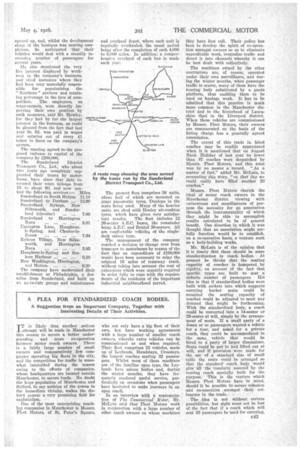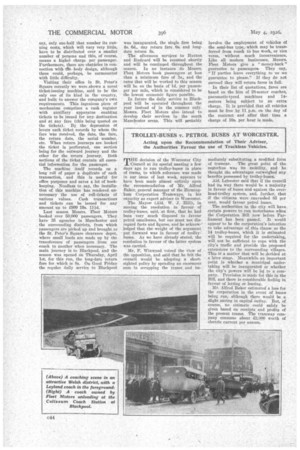A PLEA FOR STANDARDIZED COACH BODIES.
Page 27

Page 28

If you've noticed an error in this article please click here to report it so we can fix it.
A Suggestion from an Important Company, Together with Interesting Details of Their Activities.
TT is likely that another serious
attempt will be made in Manchester this season to secure a better understanding and more co-operation between motor coach owners. There is a fairly large number of small owners and comparatively few companies operating big fleets in the city, and the competition for traffic is somewhat intensified during the season owing to the efforts of companies, whose headquarters are located outside Manchester, to secure loads. No doubt the huge population of Manchester and Salford, to say nothing of the towns in the immediate vicinity, makes the district appear a very promising field for exploitation.
One of the most enterprising, coaching companies in Manchester is Messrs. Fleet Motors, of St. Peter's Square,
who not only have a big fleet of their own, but have working agreements with a large number of smaller coach owners, whereby extra vehicles can be commissioned as and when required. Their fleet comprises 22 vehicles, made up of Leylands, Maudslays, Crossleya, the largest coaches seating 32 passengers. Whilst most of those machines are of the familiar open type, the Leylands have saloon bodies and, during the winter months, they have frequently rendered nseful service, particularly on occasions when passengers have hesitated to make journeys in an open etaach.
In an interview with a representative of Th..e Commercial Motor, Mr. McLain said that Fleet Motors work in conjunction with a large number of other coach owners on whose machines
they have first call. Their policy has been, to develop the spirit of co-operation amongst owners so as to eliminate unprofitable work, centralize traffic and direct it into channels whereby it can be hest dealt with collectively.
The machines owned by the other contractors are, of course, operated under their own surveillance, and during the winter 'months, when passenger traffic is scarce, many of them have the touring body substituted by a goods platform, thus enabling them to be used on haulage work. It has to be admitted that this practice is much more common in the Manchester dis:. trict and in the hinterland of Lancashire thad in the Liverpool district. When these vehicles are commissioned by Messrs. Fleet Mettors, their ownera are remunerated on the basis of the hiring charge leis a generally agreed commission.
The extent of this trade in hired coaches may be readily appreciated when it is mentioned that on August Bank Holiday of last year no fewer than 87 coaches were despatched by Messrs. Fleet Motors, and this total was by no means a record. "AS a matter of fact," added Mr. McLain, in recounting this stery, "on that day we could easily have tiled another 20 coaches."
Messrs. Fleet Motors cherish the ideal of motor roach owners in the Manchester. district viewing with earnestness and steatlfetstness of purpose the necessity for an association through the instrumentality of which they -might be able to accomplish results calculated to be of general benefit. One direction in which it was thought that an association might usefully function would be to establish, on a co-operative basis, a venture such as a body-building works.
Mr. McLain is of the opinion that it is timely that there should be some standardization in coach bodies. At present he thinks that the 'seating capacity of coachea is hampered by rigidity, on account of the fact that specific types are built to. Seat a definite number of passengers. His idea is that if standardized bodies were built with sockets into which supports carrying bucket seats could be mounted the seating capacity of coaches could be adjusted to meet any demand that might be forthcoming. With the standardized body, a coach could be converted into a 14-seater or 28-seater at will, simply by the arrangement of seats. If a small party of a dozen or so passengers wanted a vehicle for a tour, and asked for a private roach, they could be accommodated in the same vehicle that would be hired to a party of larger dimensions. Seats could be put in and lifted out at will, and if provision were made for the use of a standard size of small table the seats could be arranged so that the standard coach body would give all the -comforts assured by the touring coach specially built for -the purpose. This is the venture which Messrs. Fleet Motors have in mind, should it be possible to secure cohesion and co-operation amongst their colleagues in the trade.
The idea is not without certain possibilities,-but sight must not be lost of the fact that if a coach which will seat 28 passengers housed for carrying,
say, only one-half that number its running costs, which will vary very little, have to be distributed over a smaller number of persons and this, of course, means a higher charge per passenger. Furthermore, there are obstacles in connection with tire body design, although these could, perhaps, be surmounted with little difficulty.
Visiting their office in St. Peter's Square recently we were shown a novel ticket-issuing machine, said to be the only one of its kind in the country, and built to answer the company's own requirements. This ingenious piece of mechanism comprises a cash register with anxiliary apparatus enabling tickets to be issued for any destination and at any fare (this being quoted on the tickets). By the depression of levers each ticket records by whom the fare Was received, the date, the fare, the return date, the serial number, etc. When return journeys are booked the ticket is perforated, one section being for the outward journey and the other for the return journey. Both sections of the ticket contain all essential information for the passenger.
The machine itself records on a long roll of paper a duplicate of each transaction, and this is useful for office purposes and saves a lot of bookkeeping. Needless to say, the installation of this machine has rendered unnecessary the use of roll-tickets of various values. Cash transactions and tickets can be issued for any amount up to £999 19s. 11 id.
Last season Messrs. Fleet Motors booked over 50,000 'passengers. They have 15 agencies in Manchester and . the surrounding districts, from which passengers are picked up and brought to the St. Peter's Square clearance depot, where small loads are made up by the transference of passengers from one coach to another when necessary. The main journey is to Blackpool, and the season was opened on Thursday, April 1st, for this run, the long-date return fare for which is Ss. On Good Friday the regular daily service to Blackpool was inaugurated, the single fare being 4s. 6d., day return fare ,6s. and longdate return Ss.
The afternoon services to Buxton and Rudyard will be resumed shortly and will be continued throughout the season. In no instance do Messrs. Fleet Motors book passengers at less than a minimum fare of is., and the rates that will be worked to this season will be on the basis of 1d. per passenger per mile, which is considered to be the lowest economic figure possible.
In future the daily service to Blackpool will be operated throughout the year instead of in the summer only. Messrs. Fleet Motors also intend to develop their services in the south Manchester areas. This will probably involve the employment of vehicles of the semi-bus type,which may be transferred from coach to bus work, or vice versa, without much inconvenience. Like all modern businesses, Messrs. Fleet Motors give a "money-back" guarantee to passengers. They say, "If parties leave everything to us we guarantee to please." If they do not succeed they will return fares in full.
In their list of quotations, fares are based on the hire of 28-seater coaches, pneumatic-tyred machines and 14seaters being subject to an extra charge. It is provided that all vehicles must he free by ii p.m. on the day of the contract and after that time a charge of 10s. per hour is made.
































